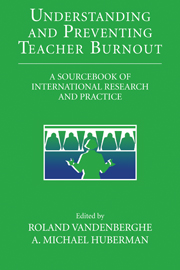Book contents
- Frontmatter
- Contents
- Contributors
- List of Figures
- List of Tables
- Foreword
- Introduction: Burnout and the Teaching Profession
- PART ONE TEACHER BURNOUT: A CRITICAL REVIEW AND SYNTHESIS
- PART TWO TEACHER BURNOUT: PERSPECTIVES AND REMEDIES
- 7 Inconsequentiality – The Key to Understanding Teacher Burnout
- 8 Turning Our Schools into a Healthier Workplace: Bridging Between Professional Self-Efficacy and Professional Demands
- 9 Teaching Career: Between Burnout and Fading Away? Reflections from a Narrative and Biographical Perspective
- 10 A Psychosocial Interpretation of Teacher Stress and Burnout
- 11 Burnout Among Teachers as a Crisis in Psychological Contracts
- 12 Progress in Understanding Teacher Burnout
- 13 Teachers' Moral Purpose: Stress, Vulnerability, and Strength
- 14 Teacher Burnout from a Social-Cognitive Perspective: A Theoretical Position Paper
- 15 Professional Identity, School Reform, and Burnout: Some Reflections on Teacher Burnout
- 16 Conflicting Mindscapes and the Inevitability of Stress in Teaching
- 17 Do Teachers Burn Out More Easily? A Comparison of Teachers with Other Social Professions on Work Stress and Burnout Symptoms
- 18 Teacher Burnout
- PART THREE TEACHER BURNOUT: A RESEARCH AND INTERVENTION AGENDA
- References
- Index
16 - Conflicting Mindscapes and the Inevitability of Stress in Teaching
Published online by Cambridge University Press: 06 January 2010
- Frontmatter
- Contents
- Contributors
- List of Figures
- List of Tables
- Foreword
- Introduction: Burnout and the Teaching Profession
- PART ONE TEACHER BURNOUT: A CRITICAL REVIEW AND SYNTHESIS
- PART TWO TEACHER BURNOUT: PERSPECTIVES AND REMEDIES
- 7 Inconsequentiality – The Key to Understanding Teacher Burnout
- 8 Turning Our Schools into a Healthier Workplace: Bridging Between Professional Self-Efficacy and Professional Demands
- 9 Teaching Career: Between Burnout and Fading Away? Reflections from a Narrative and Biographical Perspective
- 10 A Psychosocial Interpretation of Teacher Stress and Burnout
- 11 Burnout Among Teachers as a Crisis in Psychological Contracts
- 12 Progress in Understanding Teacher Burnout
- 13 Teachers' Moral Purpose: Stress, Vulnerability, and Strength
- 14 Teacher Burnout from a Social-Cognitive Perspective: A Theoretical Position Paper
- 15 Professional Identity, School Reform, and Burnout: Some Reflections on Teacher Burnout
- 16 Conflicting Mindscapes and the Inevitability of Stress in Teaching
- 17 Do Teachers Burn Out More Easily? A Comparison of Teachers with Other Social Professions on Work Stress and Burnout Symptoms
- 18 Teacher Burnout
- PART THREE TEACHER BURNOUT: A RESEARCH AND INTERVENTION AGENDA
- References
- Index
Summary
In Chapter 5 of this volume, “Intensification and Stress in Teaching”, Peter Woods argues that stress (caused by the misalignment of factors that are expected to be in harmony) is a social issue that can be examined at the micro, meso, and macro levels. The common seam for all three can be found at the meta level – the level of theory. Stress in teaching, I suggest, is an artifact of competing mindscapes that exist at the meta level. These competing mindscapes create different epistemological and axiological realities at micro, meso, and macro levels. Different realities provide the seedbed for stress for those whose realities are less powerful. In this chapter, the emphasis is on sorting out the conflicting meta-level mindscapes that contribute to stress.
Mindscapes are the reasons that people line up on different sides of the same issue even when exposed to the same facts and circumstances (Sergiovanni, 1985). Mindscapes function as personal theories and mental frames that help us shape reality. They are intellectual security blankets that affirm what we believe, say, and do. And they are road maps that provide assumptions, rules, images, and practice exemplars we need to navigate an uncertain and complex world. Teachers, school administrators, policy makers, educational researchers, corporate executives, and other groups often disagree on what constitutes good teaching, what school purposes should be, and what organizational arrangements are needed in schools because these issues are framed and understood by different mindscapes.
- Type
- Chapter
- Information
- Understanding and Preventing Teacher BurnoutA Sourcebook of International Research and Practice, pp. 256 - 268Publisher: Cambridge University PressPrint publication year: 1999
- 1
- Cited by



